-
 Bitcoin
Bitcoin $82,683.4967
0.78% -
 Ethereum
Ethereum $1,829.2967
1.42% -
 Tether USDt
Tether USDt $0.9999
-0.02% -
 XRP
XRP $2.0967
-0.75% -
 BNB
BNB $606.5472
1.02% -
 Solana
Solana $125.0276
0.61% -
 USDC
USDC $1.0000
-0.01% -
 Dogecoin
Dogecoin $0.1676
0.95% -
 Cardano
Cardano $0.6650
1.26% -
 TRON
TRON $0.2382
2.59% -
 Toncoin
Toncoin $4.1025
5.56% -
 Chainlink
Chainlink $13.5754
1.83% -
 UNUS SED LEO
UNUS SED LEO $9.1395
0.29% -
 Stellar
Stellar $0.2651
-0.15% -
 Avalanche
Avalanche $18.8485
0.75% -
 Shiba Inu
Shiba Inu $0.0...01250
0.76% -
 Sui
Sui $2.2808
-1.77% -
 Hedera
Hedera $0.1640
-1.56% -
 Polkadot
Polkadot $4.0427
0.61% -
 Litecoin
Litecoin $83.3594
-2.70% -
 MANTRA
MANTRA $6.2703
0.56% -
 Bitcoin Cash
Bitcoin Cash $304.1339
1.64% -
 Bitget Token
Bitget Token $4.5229
-1.25% -
 Dai
Dai $0.9999
-0.02% -
 Ethena USDe
Ethena USDe $0.9998
-0.03% -
 Pi
Pi $0.7229
-6.19% -
 Hyperliquid
Hyperliquid $13.0555
5.79% -
 Monero
Monero $215.2463
-1.28% -
 Uniswap
Uniswap $6.0107
2.74% -
 Aptos
Aptos $5.2988
0.53%
What are the hard forks and soft forks of blockchain?
Hard forks create a permanent split in blockchain, resulting in two cryptocurrencies, while soft forks are backward-compatible upgrades without splitting the network.
Mar 26, 2025 at 10:21 pm
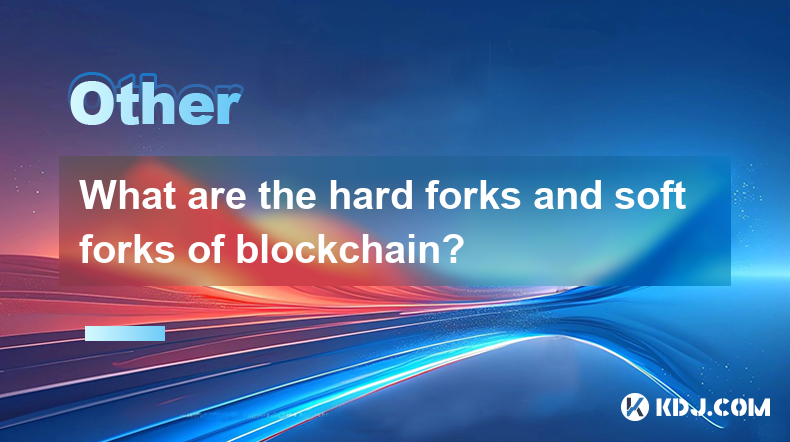
Understanding Hard Forks and Soft Forks in Blockchain
A blockchain, at its core, is a shared, immutable ledger. However, this ledger isn't static; it evolves through updates and changes. These changes are implemented via forks, which are essentially branching points in the blockchain's history. There are two primary types: hard forks and soft forks. Each has distinct characteristics and implications for the cryptocurrency ecosystem.
Hard forks represent a significant change to the blockchain's protocol. This means that nodes running the old version of the software are no longer compatible with nodes running the new version. This incompatibility leads to the creation of a completely separate blockchain, effectively splitting the original cryptocurrency into two distinct cryptocurrencies. The original blockchain continues, but a new one is born. This often happens due to disagreements within the developer community regarding the direction of the project.
Hard forks create a permanent divergence. This means that transactions valid on one chain are not necessarily valid on the other. Consider Bitcoin Cash (BCH) which originated as a hard fork of Bitcoin (BTC). BCH introduced larger block sizes, a key point of contention within the Bitcoin community. This fundamental difference led to the permanent split, with both BTC and BCH existing independently.
Soft forks, conversely, are backward-compatible. This means that nodes running the old software can still process transactions created by nodes running the new software. Essentially, the new rules are added to the existing ones, without breaking the compatibility of the older versions. This makes soft forks a less disruptive way to upgrade a blockchain.
Soft forks are generally easier to implement than hard forks because they don't require a complete split of the network. They are often used to introduce bug fixes, minor protocol improvements, or to activate new features gradually. SegWit (Segregated Witness), a significant upgrade to the Bitcoin network, was implemented as a soft fork. It improved transaction scalability and efficiency without requiring a complete network split.
The choice between a hard fork and a soft fork depends heavily on the nature and scope of the proposed changes. Minor changes, like bug fixes or small protocol improvements, are usually best suited for soft forks. Major changes that require fundamental alterations to the blockchain's structure or consensus mechanism are typically implemented as hard forks.
This difference in compatibility has profound implications for users. With a hard fork, users might find themselves holding two different cryptocurrencies, one from the original chain and one from the new chain. With a soft fork, users generally don't experience any immediate disruption; their existing wallets and software continue to function seamlessly.
Let's delve deeper into the process of each type of fork.
Hard Fork Process: A Step-by-Step Guide
A hard fork involves a significant alteration to the blockchain's rules. This requires a coordinated effort from a large portion of the network's miners and nodes. Here's a breakdown:
- Proposal: A proposal for the hard fork is put forward, outlining the changes to be implemented.
- Community Discussion: The proposal is discussed and debated within the community.
- Software Development: Developers create the updated software incorporating the proposed changes.
- Node Upgrade: Nodes on the network are upgraded to the new software.
- Mining Support: A sufficient number of miners must support the new rules for the hard fork to be successful.
- Chain Split: If enough miners support the new rules, the blockchain splits, creating a new, independent chain.
Soft Fork Process: A Step-by-Step Guide
Soft forks are generally less complex and disruptive. Here’s the process:
- Proposal: A proposal for the soft fork is presented, detailing the changes.
- Community Discussion: The community discusses and reviews the proposal.
- Software Development: Developers create the updated software.
- Node Upgrade: Nodes are upgraded to the new software.
- Activation Threshold: The soft fork activates once a predetermined percentage of nodes are running the updated software.
The success of both hard and soft forks depends largely on community consensus and developer collaboration. A lack of consensus can lead to a failed fork or even the creation of competing chains. The level of support from miners is crucial, especially for hard forks.
Frequently Asked Questions
Q: What happens to my cryptocurrency during a hard fork?
A: During a hard fork, you generally receive an equivalent amount of the new cryptocurrency on the forked chain. However, this isn't guaranteed and depends on the specifics of the hard fork and your wallet's support for the new chain.
Q: Are soft forks risky?
A: Soft forks are generally less risky than hard forks because they maintain backward compatibility. However, bugs in the new software could still potentially affect the network.
Q: What is the difference between a hard fork and a soft fork in terms of network impact?
A: A hard fork creates a permanent split in the blockchain, resulting in two separate cryptocurrencies. A soft fork doesn't split the chain; it's a gradual upgrade.
Q: Can a soft fork be reversed?
A: Yes, a soft fork can be reversed, as it's backward compatible. The network can revert to the previous rules if necessary.
Q: What are some examples of famous hard forks?
A: Bitcoin Cash (BCH) from Bitcoin (BTC), Ethereum Classic (ETC) from Ethereum (ETH), and Litecoin (LTC) from Bitcoin are prominent examples.
Q: What are some examples of famous soft forks?
A: SegWit (Segregated Witness) for Bitcoin and several upgrades on various altcoins are examples.
Q: How do I know if my wallet supports a hard fork?
A: Check your wallet provider's documentation or announcements for information on support for specific hard forks. If your wallet doesn't support it, you might need to transfer your coins to a compatible wallet.
Q: What are the long-term implications of a hard fork?
A: Hard forks can lead to increased competition, innovation, and potentially higher market capitalization for the cryptocurrencies involved. However, they can also lead to confusion and fragmentation within the community.
Disclaimer:info@kdj.com
The information provided is not trading advice. kdj.com does not assume any responsibility for any investments made based on the information provided in this article. Cryptocurrencies are highly volatile and it is highly recommended that you invest with caution after thorough research!
If you believe that the content used on this website infringes your copyright, please contact us immediately (info@kdj.com) and we will delete it promptly.
- Bitcoin (BTC) price dips below ascending channel pattern as whales mirror a 2020 bull run signal
- 2025-04-01 07:50:12
- Mutuum Finance (MUTM) Has Been Relatively Quiet, But It's Building Fast
- 2025-04-01 07:50:12
- Cardano (ADA) Gains 4% This Week, Trading at $0.74 as Bullish Pressure Builds
- 2025-04-01 07:45:12
- Elon Musk Quashes Rumors of U.S. Government Using Dogecoin (DOGE) in Any Kind of Operations
- 2025-04-01 07:45:12
- Ethereum (ETH) and Solana (SOL) Prices Could Plunge as FTX Begins Creditor Repayments on May 30
- 2025-04-01 07:40:12
- Acting SEC Chair Rejects Enforcement, First US Bank-Issued Stablecoin, Bitcoin's Four-Year Cycle at Crossroads
- 2025-04-01 07:40:12
Related knowledge
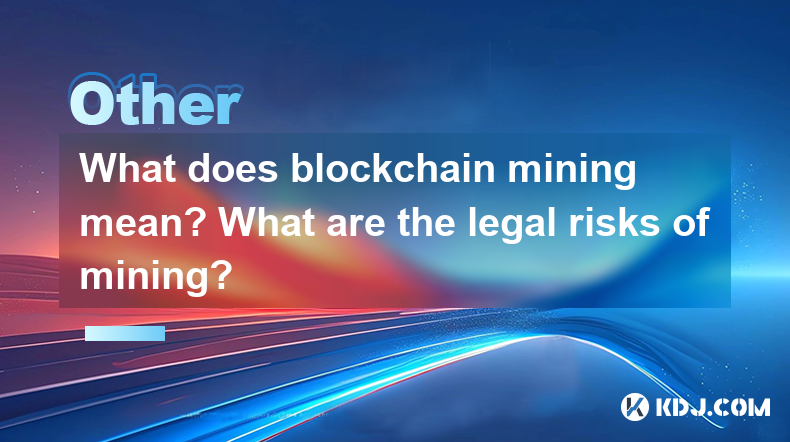
What does blockchain mining mean? What are the legal risks of mining?
Mar 31,2025 at 05:07pm
Blockchain mining is the process by which transactions are verified and added to the public ledger, known as the blockchain. Miners use powerful computers to solve complex mathematical problems, which, once solved, allow them to add a block of transactions to the blockchain. In return, miners are rewarded with cryptocurrency, typically Bitcoin. This pro...
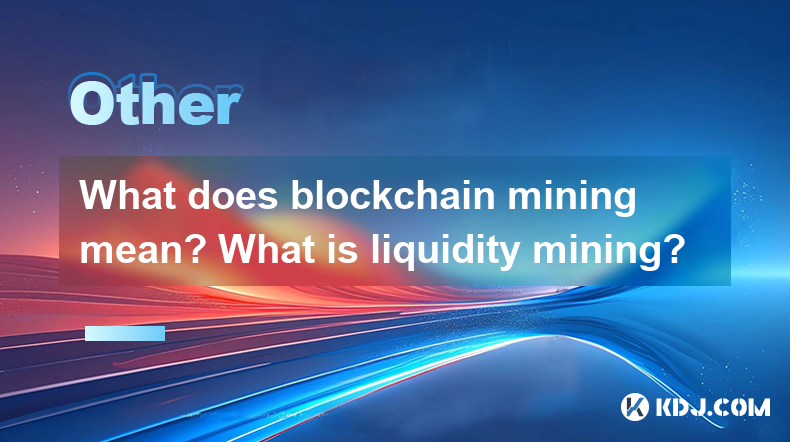
What does blockchain mining mean? What is liquidity mining?
Apr 01,2025 at 12:07am
What is Blockchain Mining?Blockchain mining is a critical process in the world of cryptocurrencies, particularly for networks like Bitcoin and Ethereum. It involves the use of computational power to solve complex mathematical problems, which in turn validates transactions and adds them to the blockchain. Miners are incentivized through rewards, typicall...
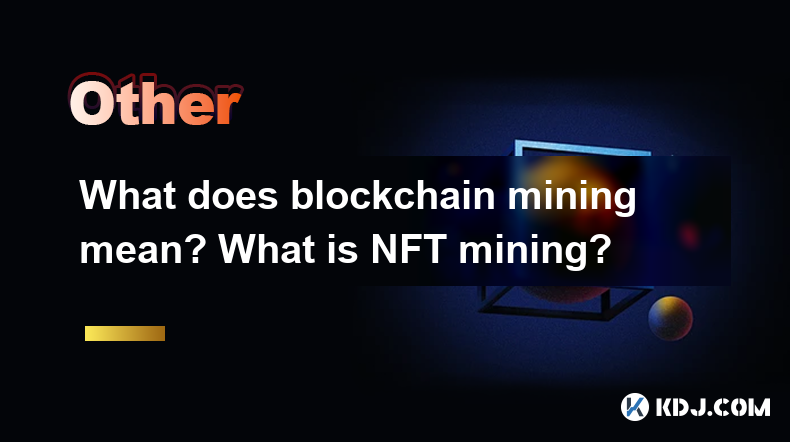
What does blockchain mining mean? What is NFT mining?
Mar 31,2025 at 04:07pm
Blockchain mining is a crucial process in the world of cryptocurrencies, particularly for networks like Bitcoin and Ethereum. It involves verifying transactions and adding them to the blockchain, a decentralized ledger. Miners use powerful computers to solve complex mathematical problems, which, when solved, allow them to add a block of transactions to ...
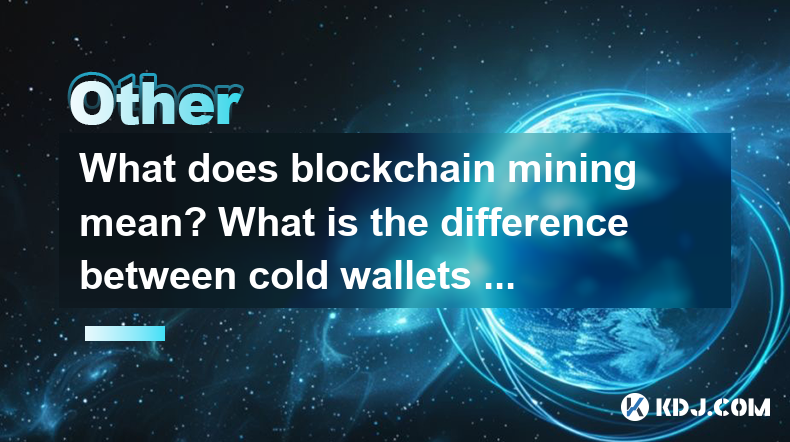
What does blockchain mining mean? What is the difference between cold wallets and hot wallets for mining?
Apr 01,2025 at 07:56am
Blockchain mining is a critical process in the world of cryptocurrencies. It involves verifying transactions and adding them to the blockchain, a decentralized ledger. Miners use powerful computers to solve complex mathematical problems, which, when solved, allow them to add a block of transactions to the blockchain. In return, miners are rewarded with ...
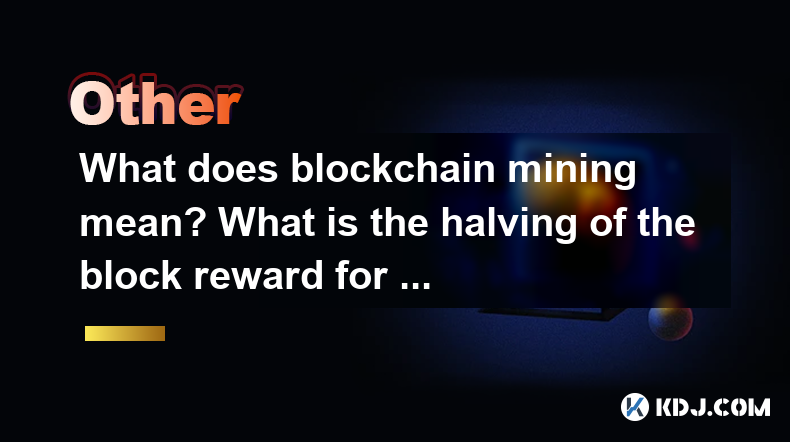
What does blockchain mining mean? What is the halving of the block reward for mining?
Mar 31,2025 at 03:43pm
Blockchain mining is a crucial process in the world of cryptocurrencies, particularly for networks like Bitcoin. It involves solving complex mathematical problems to validate transactions and add them to the blockchain, a public ledger of all cryptocurrency transactions. Miners use powerful computers to compete in solving these problems, and the first t...
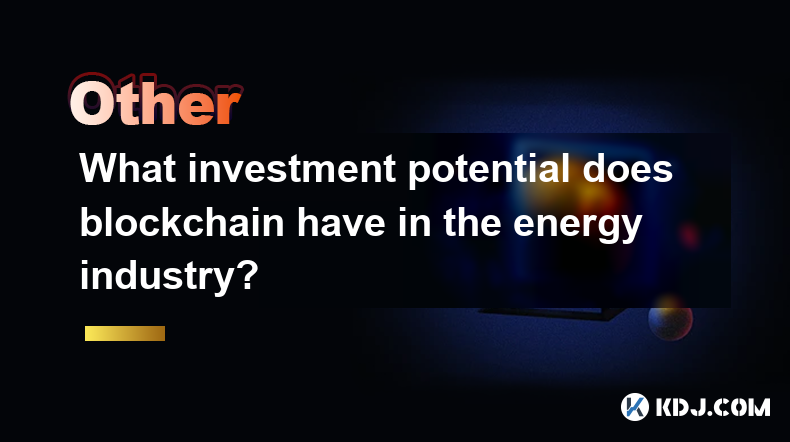
What investment potential does blockchain have in the energy industry?
Mar 31,2025 at 11:14pm
Blockchain technology, initially popularized by cryptocurrencies like Bitcoin, has shown remarkable potential to revolutionize various industries, including the energy sector. Its decentralized nature and ability to facilitate secure, transparent transactions offer unique solutions to longstanding challenges in energy distribution, management, and tradi...

What does blockchain mining mean? What are the legal risks of mining?
Mar 31,2025 at 05:07pm
Blockchain mining is the process by which transactions are verified and added to the public ledger, known as the blockchain. Miners use powerful computers to solve complex mathematical problems, which, once solved, allow them to add a block of transactions to the blockchain. In return, miners are rewarded with cryptocurrency, typically Bitcoin. This pro...

What does blockchain mining mean? What is liquidity mining?
Apr 01,2025 at 12:07am
What is Blockchain Mining?Blockchain mining is a critical process in the world of cryptocurrencies, particularly for networks like Bitcoin and Ethereum. It involves the use of computational power to solve complex mathematical problems, which in turn validates transactions and adds them to the blockchain. Miners are incentivized through rewards, typicall...

What does blockchain mining mean? What is NFT mining?
Mar 31,2025 at 04:07pm
Blockchain mining is a crucial process in the world of cryptocurrencies, particularly for networks like Bitcoin and Ethereum. It involves verifying transactions and adding them to the blockchain, a decentralized ledger. Miners use powerful computers to solve complex mathematical problems, which, when solved, allow them to add a block of transactions to ...

What does blockchain mining mean? What is the difference between cold wallets and hot wallets for mining?
Apr 01,2025 at 07:56am
Blockchain mining is a critical process in the world of cryptocurrencies. It involves verifying transactions and adding them to the blockchain, a decentralized ledger. Miners use powerful computers to solve complex mathematical problems, which, when solved, allow them to add a block of transactions to the blockchain. In return, miners are rewarded with ...

What does blockchain mining mean? What is the halving of the block reward for mining?
Mar 31,2025 at 03:43pm
Blockchain mining is a crucial process in the world of cryptocurrencies, particularly for networks like Bitcoin. It involves solving complex mathematical problems to validate transactions and add them to the blockchain, a public ledger of all cryptocurrency transactions. Miners use powerful computers to compete in solving these problems, and the first t...

What investment potential does blockchain have in the energy industry?
Mar 31,2025 at 11:14pm
Blockchain technology, initially popularized by cryptocurrencies like Bitcoin, has shown remarkable potential to revolutionize various industries, including the energy sector. Its decentralized nature and ability to facilitate secure, transparent transactions offer unique solutions to longstanding challenges in energy distribution, management, and tradi...
See all articles























































































